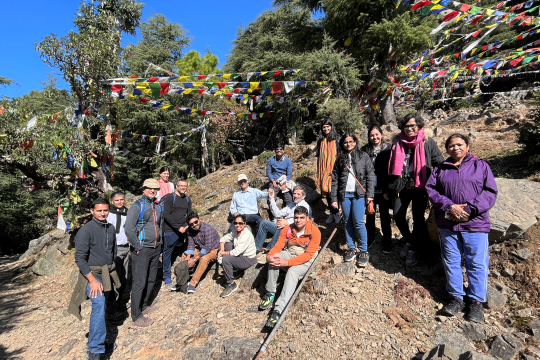The Emissions Pricing for Development (EPfD) collaborative concluded its research & policy workshop in Dharamshala, India, focusing on the public acceptability of carbon pricing in developing countries and instruments for fair climate policies.
EfD India, CECFEE (ISI Delhi), host of the EPfD collaborative, concluded its annual research and policy workshop in November 2022.
E. Somanathan, one of the EPfD leaders introduced the EPfD collaborative in his opening remarks, highlighting the role of fuel taxes as a potential instrument to reduce emissions, particularly at the early stages of development. The broad research focus of the EPfD collaborative featured prominently in the workshop, with presenters and attendees discussing the importance of carbon pricing vis-à-vis alternative policy instruments to aid the green energy transition.
Public acceptance of carbon pricing depends on trust in government
EPfD leader, Thomas Sterner presented a key study on the political acceptability of carbon pricing among a sample of protesters in Sweden, underscoring the role of trust in government and fairness in the design of environmental policies. An enriching discussion ensued, with participants debating whether all countries ought to pay the same carbon price given concerns regarding social equity and justice in CO2 abatement. For instance, financing emerging economies to support decarbonization and adaptation to climate change may be required.
The introduction of carbon pricing may depend on the governance structure, with differences in the political acceptability and feasibility of emissions pricing in socialist vs. autocratic structures. Transparency of government budgets, use of revenues, and fungibility of budgets vis-à-vis earmarking of revenues were also highlighted as relevant considerations. The need for adaptation to climate change and the distributional incidence of carbon taxation were underscored as significant factors determining political feasibility.
Is a global carbon price optimal?
Should economies implement first-best carbon pricing policies or focus on second-best policies that target specific sectors with a high potential for emissions reduction? Dr. Marc Hafstead, Director of the Carbon Pricing Initiative at Resources for the Future, presented results from a joint study with Prof. Lawrence Goulder (Stanford University) and Prof. Roberton Williams (University of Maryland). The analysis in this study considered the economic efficiency of introducing carbon pricing for the power sector in the United States relative to an economy-wide carbon price. An efficient pricing policy must consider the ease of substitution. It is cheaper for upstream power plants to switch fuels than for downstream consumers to adjust their transportation demand. Therefore, carbon pricing for the power sector may be more sensible than an economy-wide price which would also raise costs for those using fossil fuel-based transportation – at least in the US.
The subsequent discussions focused, in part, on the technical assumptions underlying the general equilibrium framework presented, including how easily clean and dirty fuels could be substituted in the future as prices of renewable energy eventually decline. The discussion also focused on the political economy of mineral extraction and trade and other externalities of renewables such as pollution from lithium extraction. The risk of methane leakage from the supply of hydrogen fuels was also highlighted.
Way forward for climate policy
A rich research agenda, within the broad theme of emissions pricing for development, appears to have developed. First, the incidence of carbon taxation in low- and middle-income countries. Second, public acceptance of fuel taxes in developing countries and the role of governance structures in the feasibility of implementation. Lastly, the research agenda would also focus on the decarbonization of industry and the role of non-fossil fuel-based energy sources in production activities, especially in developing countries.
By: Ishita Datta.


